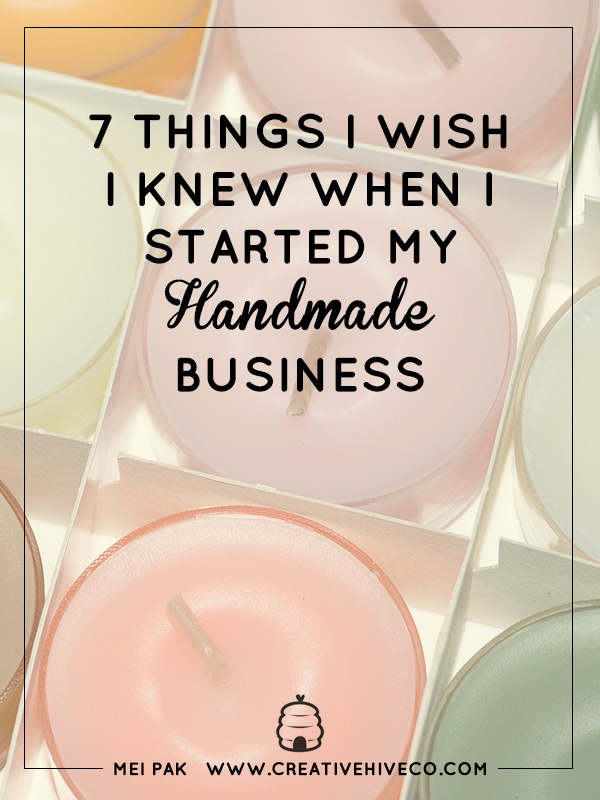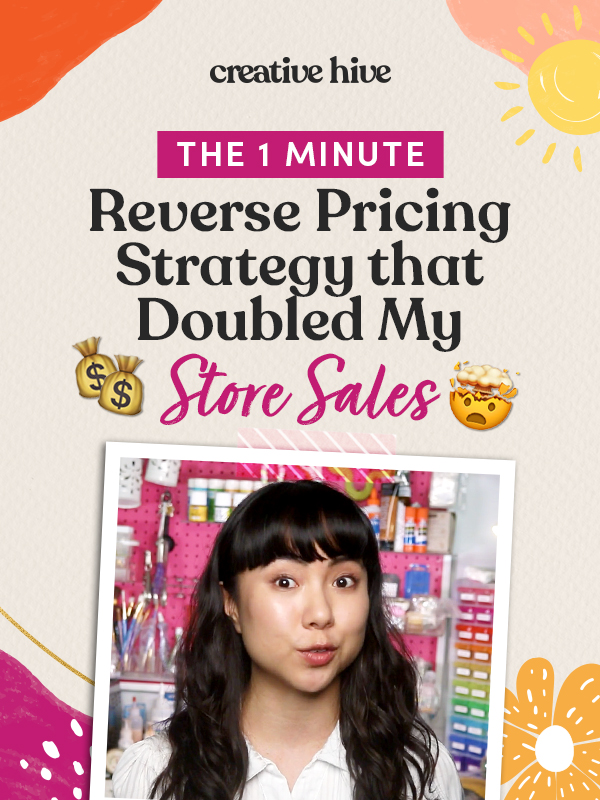I want to help you build a sustainable, profitable handmade business that makes you consistent income and sales. I only ever teach or recommend marketing, social media, pricing, production and branding tips that I’ve personally used successfully in my own 7-figure handmade businesses.
I'm Mei, from Los Angeles!
Read More
Popular Posts You'll Love
Looking for something?
Categories
starting a business
get more traffic
running a business
make more sales
branding
growing a business
mindset & productivity
podcasts
pricing & money
product photography
reviews
selling on etsy
selling on amazon
social media
selling wholesale
- Facebook170
- Twitter132
- Pinterest20.3K
- 20.6Kshares
You’ve got a crafty hands and an imagination that’s encouraging you to sell your products online.
You’re oozing with ideas for the potential products, maybe even a couple of social media handles already in place.
Slowly you’ve started to gather materials to start a website.
Things are moving along, but you stop to think, fairly often, someone has got to have some insight how to do this!?
After some time, you’ve officially perfected your handmade product and made an amazing website, and now you feel like you’re ready to take over the world one sale at a time.
That’s fantastic!
Starting a business is exciting and incredibly rewarding.
But as you probably already know, running a handmade business is not always easy.
The to-do lists never end, and it’s up to you to do every single task as your business’s maker, advertiser, social media guru, customer service associate, accountant, project manager, and everything in between.
When I started my company Milton and Margie’s Soy Wax Candles nine years ago, I was great at making my candles, but completely clueless about actually running the business.
I’m actually still learning better processes and strategies every day.
So to give you a bit of an advantage, I’m sharing seven things I wish I knew before I took the plunge into running a handmade business.
1. Price your work for profit
Don’t start out underselling yourself.
I know I sure did, because I desperately wanted to make sales.
But that way of thinking quickly depletes your budget and energy.
Plus, customers will perceive your product as less valuable if it’s underpriced.
Fortunately, there are formulas to help you form a realistic idea of how much to charge.
You just need to know the cost of your materials, time, and wholesale markup (generally 2–2.5 times the cost of materials and time).
I recommend Creative Hive’s free pricing calculator.
2. Find a mentor/group of likeminded crafters you trust
It is vital to find your crafty tribe.
They can give you advice on all facets of running a handmade business, and can make recommendations for craft shows and shops that are a good fit for your work.
My crafter friends and I even share booths at craft shows to cut our costs.
If you go full-time as a business owner, working from home can get pretty lonely.
You know who else is at home working alone?
Your fellow business friends, and they’d probably love to meet at a coffee shop and get some administrative work done.
Where do you find crafters?
Attend seminars and workshops on running small businesses, go to craft shows, find a crafty gathering on Meetup.com, and hit the Etsy forums.
I’ve made some of my best friends this way.
3. Outsource where you can
No solopreneur can get everything done on her own—even Beyonce has help—so don’t be afraid to reach out.
When I got a massive order from a major retailer, I screamed with both joy and terror, and that’s when I knew I needed help.
First I invited my friends over a night of tagging items, and I paid them with pizza and beer.
Then, because I was in constant production mode and didn’t have time to do all the other fun stuff like marketing and maintaining my website, I hired a part time assistant to take on some of the work.
4. Tap into your community’s resources
Making connections with the businesses and organizations in your area is a great way to get noticed.
Maybe you make dog collars.
You could make a donation to an area pet shelter in exchange for setting up a booth at one of their events.
Charities regularly need raffle items for galas and generally always let you include marketing materials with the product.
Businesses can also provide free resources.
I make candles in reused cans—at first this was easy, because I just saved any cans I used for dinner and asked friends and family to do the same.
But as my company has grown, I now need A LOT of cans.
I went to my local recycling center and asked if I could bring my recyclables to them in exchange for cans, and they happily agreed.
If a small business receives a lot of shipments, the owners are usually happy to save supplies like bubble wrap and packing peanuts for someone who wants to reuse them.
5. Get meticulous about your finances
This has been the hardest lesson for me, because I can hardly balance my own personal budget.
But in order to be successful, you need to record every single penny that comes in and goes out, and crunch those numbers.
You’ll find which products and processes are working and which aren’t, in addition to identifying avenues where you can save money.
It’s certainly not fun, but it will allow you to keep doing the fun parts!
For a low monthly fee, there are many online services that help small business owners track finances, including Quickbooks and Outright—my personal favorite.
6. When you get no answer, it doesn’t mean “no”
Reaching out to shops to establish a wholesale or consignment relationship can be intimidating.
What if they don’t like my work?
The reality is that some won’t, and that’s okay.
However, if a shop owner hasn’t responded—and definitely if they haven’t outright said “no”—think of it as an invitation to follow up.
Shop owners are extremely busy and they’re balancing as many plates as you are, so they don’t have a ton of time to respond to emails.
After contacting a shop for the first time, if I haven’t heard back in week or more, I push my social anxiety aside and contact them for a second time.
I’ll contact them a third time, and then do my “final push” to see if they’re interested.
I’ve found that this works, and many shop owners even thank me for following up (instead of hating me forever, which is always my worry!).
Pro tip: Send them a package with small product samples and your marketing materials.
Everyone loves free gifts.
7. You aren’t going to be an overnight sensation, and that’s okay!
Running a small business is one giant learning process, and success rarely comes overnight.
You need to embrace the uncertainty and strive toward learning something new every day (and take a break once in awhile for your sanity’s sake).
The only thing that will cause your business to “fail” is if you stop making and selling your products.
So this is the easiest part of running your business: don’t give up.
Even when you’re sad that you didn’t get a sale or got rejected from your favorite craft show—never give up.

Jess Snively has been running Milton and Margie’s Soy Wax Candles since 2008. She transforms discarded cans and an eclectic assortment of vintage dishware into 100% sustainable soy candles with scents inspired by the Midwest. She’s located in Chicago and lives just a few blocks from Lake Michigan, her favorite place to take her dog Wheezy when she’s not churning out soy candles.
You can check out her work at Milton and Margie’s Soy Wax Candles and keep up with her craft shows, candle-making classes, and new products on Instagram and Facebook.

Leave a Comment
Liked this article? Share it!
Unlock a Profitable Handmade Business
in Just 12 Weeks Without Using Etsy
or Social Media
FREE WORKSHOP
This workshop is for anyone who makes and sells a handmade or physical product, including jewelry designers, artists, paper designers, bath & body product makers and more!
What You'll Discover
The #1 mistake people make with Etsy & social media that causes shops to FLOP
The secret to making it with your handmade shop so it's no longer just a hobby
How to make sales in your handmade shop with ease so you can finally get to 6-figures
TAKE ME THERE
Your email address will not be published. Required fields are marked *
Leave a Reply Cancel reply
About
Blog
A Sale A Day
Student Login
Free Class
Contact
Terms
Become A Student
Watch On YouTube
Student Reviews
See My Handmade Shop!



Amazing & motivated article! I’m half ready to launch my website & start my business for real! This helps! Thanks a lot! X
Thank you so very much. I needed to read this. X
I am grateful, this was very helpful.
Good reading!
Sometimes I feel like the hardest part is not having overnight success! Waiting is difficult lol But there is so much to learn in the process, so waiting isn’t always a bad thing.
Good article. Thanks especially about the info at contacting shops and being persistent, I really needed to hear that!
Thank you for sharing! I’m in the beginnings but enjoying the process. Look forward to more of your reads.
I needed to hear that part, ” you can only fail if you stop making and selling your products”. I have stopped so many times and watched my sewing materials…but I will not stop. I will get my own store and I will be successful. Thank you so much from Trinidad and Tobago.
Such a great article! Informative and motivating. Please continue to share content like this!
Love this article!! Thank you for the guidance. I especially needed this because I tend to micro manage everything! Like you, I dont even balance a checkbook or have a budget… for anything.
this is very helpful. tip no 6. how do you price your things so that both you and your retailer make a profit and avoid over charging?
Yes !!! Thanks for the motivation.
Thanks for a very motivating article. I am now starting out on my new handmade biz journey and have saved your article for my own information and guidance.